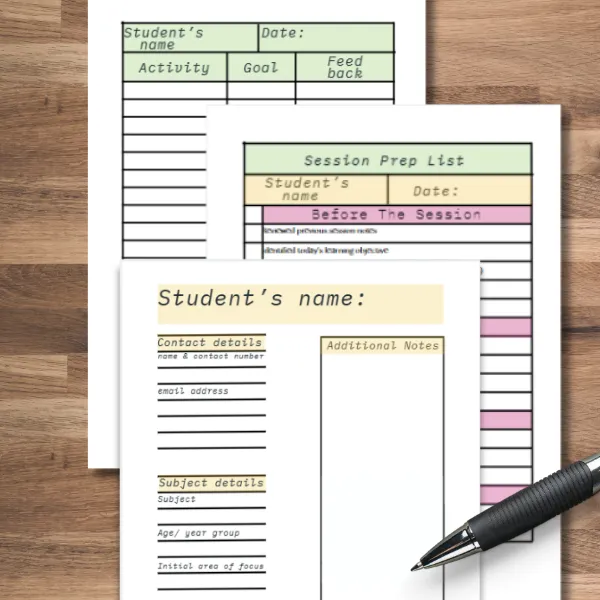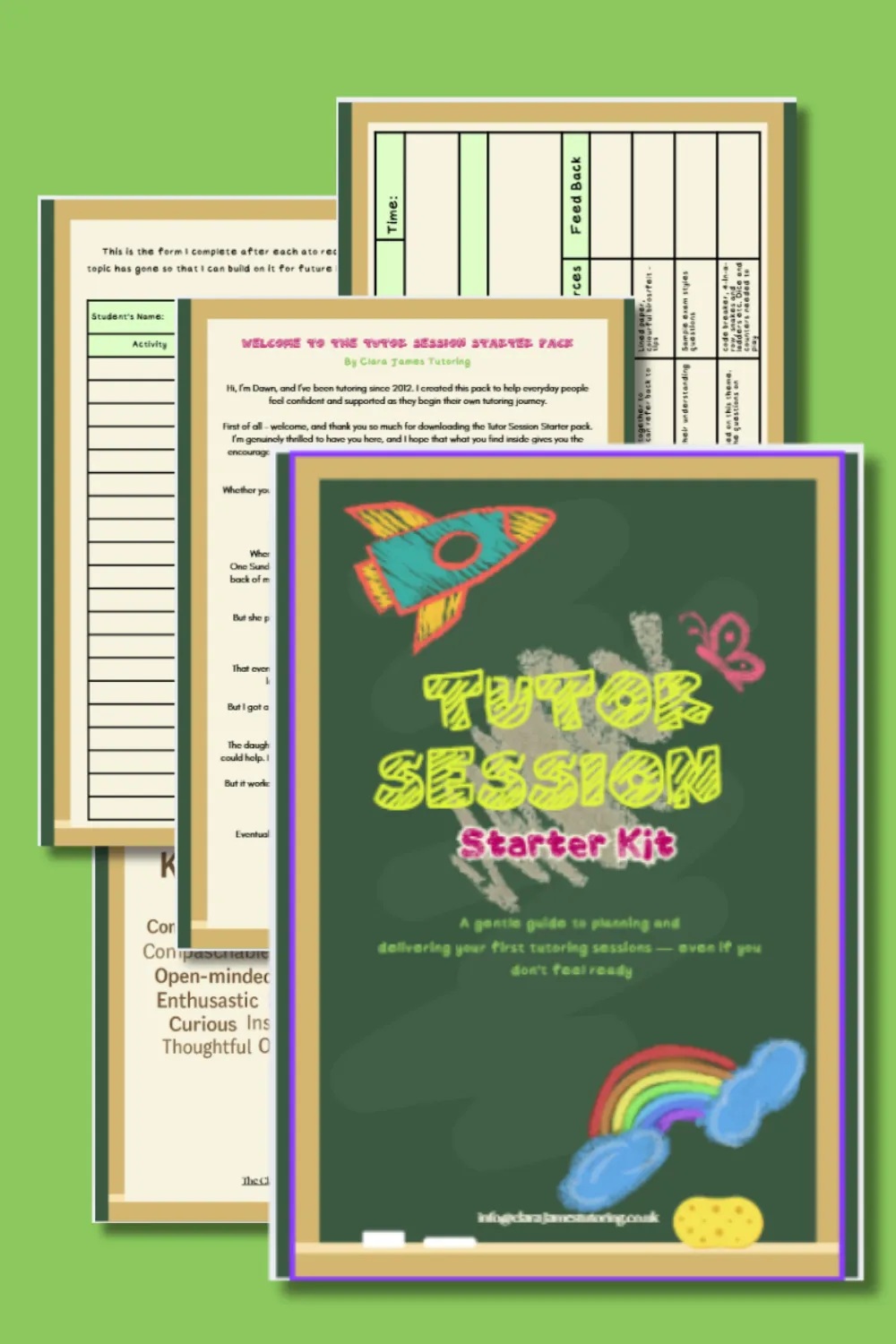
What steps do I take to become a tutor? How easy is it to become a tutor?
It’s one of those classic catch-22 situations: you can’t get experience until you start, but it’s hard to start without experience. From my time building Clara James Tutoring and supporting others in becoming tutors over the past decade, this would be my advice:
If you'd rather watch a video version of the article click here
What Steps Do I Take to Become a Tutor?
1. Define Your Why
What’s motivating you to tutor; flexibility, passion for a subject, making a difference?
Why do you want to tutor? Is it just for the money? Or do you have a passion for your subject and want others to love it the way you do? Maybe it’s because you’ve been teaching in the classroom and, although you love the children and the job, the politics and the stress are now proving too much, and it’s time to move on, this seems like the perfect opportunity.
Or is it the dream of making “easy money” while working for yourself? No constraints, no boss, just you doing your own thing. (Please can I suggest that you read: “Is tutoring easy money?” at this point, if that is your reason why.)
Are you looking for a side hustle or to build a full-time business?
Maybe you’re not trying to change the world or make a fortune. You might simply want to support a few individuals each week — giving them your full focus instead of spreading yourself too thin.
As with all of these questions, there are no right or wrong answers, just things to consider before you throw yourself in.
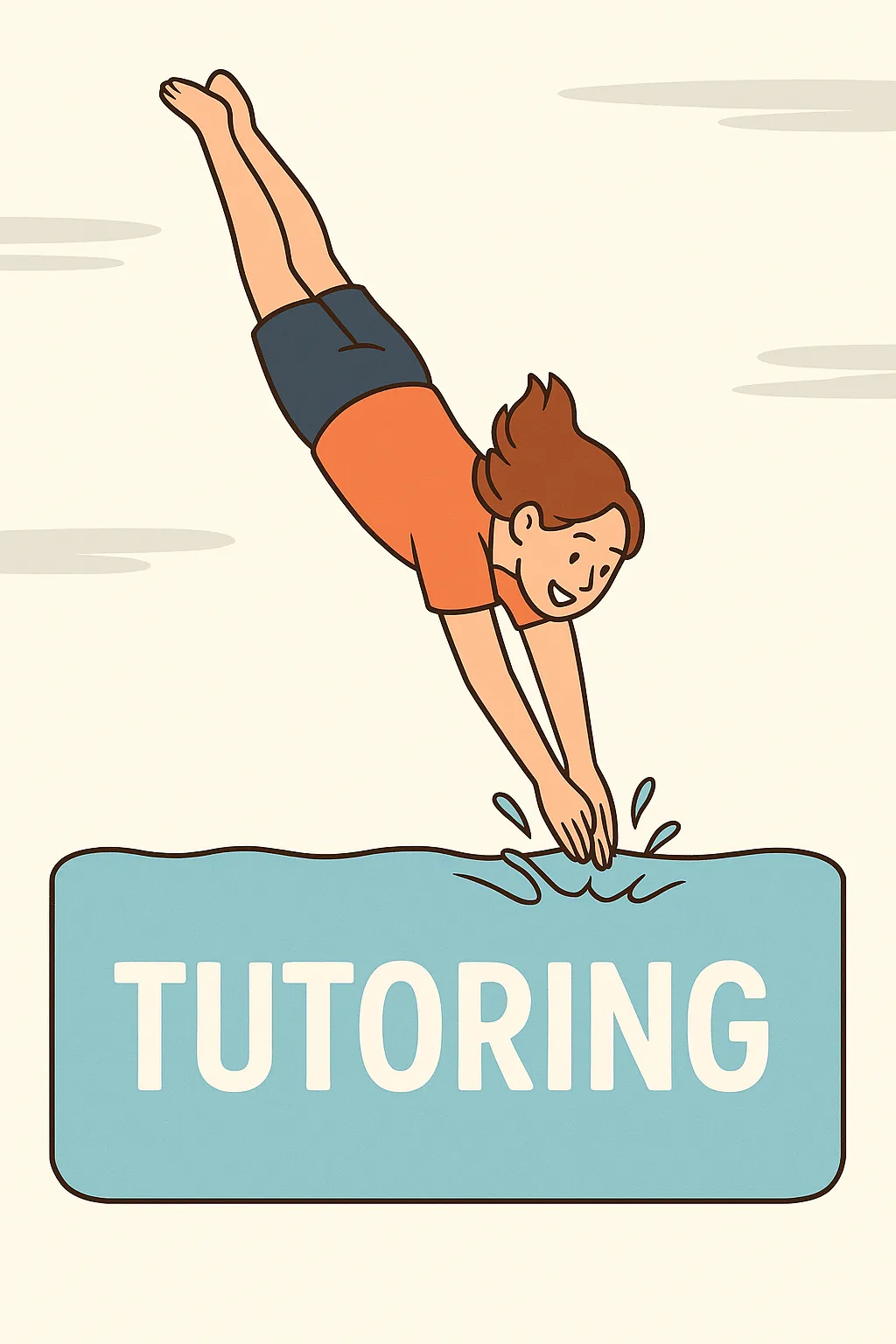
Are you looking for a side hustle or to build a full-time business?
Decide What You’ll Tutor
What subject do you feel confident in tutoring?
This probably seems like a question that requires very little thought: I want to be a French tutor, a history tutor, a maths tutor.
But think about it on a deeper level. What age group would you like to work with? Knowing exactly who you want to tutor will be one of your biggest assets.
An analogy that is often used is that if you’re looking for brain surgery, you would want to go to someone who specialises, someone advanced in their skills and knowledge, not a general practitioner.
As a tutor, if you can create the reputation of someone who specialises, your business will thrive far more quickly, and you’ll be able to charge higher prices accordingly.
It takes time to build that reputation, but it is worth the effort, so think clearly about who you want to tutor. (I have been studying learning styles for over 20 years, and this has become one of the key things we have become known for.)
Which age groups or educational levels are you most suited to tutor?
There’s a huge difference between supporting a 5-year-old and a 15-year-old. There is also a remarkable difference in how you would support a 55-year-old who has returned to education—the resources you prepare, your knowledge, your energy levels.
One of the first lads I ever worked with was autistic. He was such a great lad, but the lessons were very high-energy. They revolved around playing games, and each time he won (which was inevitably every game) we would have to throw our arms in the air, cheer, and celebrate. I loved those lessons, but you finished feeling both mentally and physically drained. However, on the whole—even though you may play games against an older child, they are calmer. There is less emotional involvement.
Will you tutor online, in person, or both?
Another consideration is: where will your lessons take place? As with most things, there are pros and cons to each option.
In-person, you’ll need either a suitable space where you won’t be interrupted and that is deemed professional (you cannot invite a child to use your desk in your bedroom—it would be deemed very inappropriate, regardless of how innocent your intentions). You’ll also need to prepare physical resources.
However, online, you can quickly turn on the computer and easily upload the resources. There’s much less of a time or potential financial commitment. But there’s also less opportunity to build a rapport with the child and their family. Although this may sound insignificant, it’s often through that rapport that they recommend you to others. I’ve found a very strong correlation with this.
Prior to lockdown, I was very opinionated that lessons ought to take place in the child’s own home. I believed (and still do) that if the child was in an environment where they felt comfortable and confident, they would be in a better mindset to learn.
However, when the pandemic struck in 2020 and we were put into lockdown, I had two choices: lose the business and everything I had worked so hard to achieve over the past years, or be willing to embrace the opportunity to do online lessons.
We chose to adapt and introduce online lessons.
A lad I was working with at the time would talk me through the different tabs and functions on Zoom. He made me laugh, just before lockdown, they had gotten a young puppy. A minute or two before the lesson started, he would ask if he could have a minute (I presumed it was so he could pop to the toilet). He would then re-emerge after half an hour or so. It turned out he’d been playing with the puppy in the garden. I have so much to be thankful for to him.
We now offer both online and face-to-face lessons. This way, we can broaden our geographical reach, but it also gives parents options for what works for them—rather than me enforcing my opinion onto people.
However, I’ve found in the past year or two that most parents want to return to in-person lessons. My ratio of online to in-person lessons is probably around 1:20.
3. Consider What Makes a Good Tutor
Key qualities: patience, adaptability, empathy, subject knowledge.
Every family is looking for what will work best for them and their child. How you promote yourself as a tutor will hugely influence what qualities you will need as a tutor.
However, I would say the best tutors are:
Calm and demonstrate a sense of patience
Clear in their explanations but at the same time willing to accept when they are not explaining something in a way that the specific child they are working with will understand it, so they need to rephrase it.
Flexible in how they present their lessons: what support does that specific, individual child need to achieve their goals.
Being able to relate to a student’s struggles or frustrations helps build trust. Empathy enables you to respond to each student’s unique needs and emotional state.
Remember that every student is different, so you need to be able to tailor your approach to meet the student’s learning style, interests, and strengths, making lessons as engaging and effective as possible.
You need to be like a chameleon and adapt to what is happening around you. Each student you work with is like taking on a different role in a different play, so it is suitable for their understanding.
A solid understanding of the subject matter is essential, so that you can answer questions confidently and explain concepts in various ways. Though there will be times when you are asked questions that you don’t know the answer to and that is fine as well. Work it out together as a team or tell them that you will find out for next time. It’s ok to be honest and admit that nobody knows everything.
An ability to explain complex ideas in simple terms, ask helpful questions, and actively listen to understand where they might need extra help.
A positive outlook
Organised
When a student is struggling, you need to think creatively to find alternative explanations or strategies to help them understand.
An enthusiasm for the subject and a genuine interest in helping students learn and make sessions enjoyable and inspiring.
Finally, Commitment and Reliability
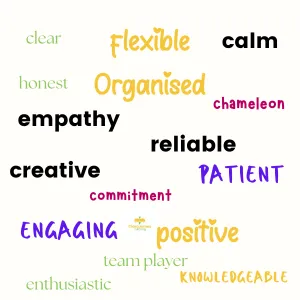
There are multiple qualities that create a good tutor
Think about your tutoring style—academic rigor, creative play, visual aids?
I am a firm believer in variety. When I was studying dyslexia and different learning styles, something I learned was that is we just keep giving someone more and more of the same to do we are only helping them to create one memory. However, if we use a variety of resources to help them to learn we are helping them to create multiple memories so if their brain is not thinking in a linear fashion because they are neurodiverse, or stressed because the teacher has just picked on them to answer a question in front of the class, or their sitting in an exam hall and the nerves are setting in, there will be more places inside their brain where they will discover the information that they need making it easier to locate it.
Because of this I always have a variety of resources with me. It might be plain paper to create “how to solve” revision sheets, exam style questions or worksheets for those who want them, a range of games, codebreakers, etc.
I then allow the child to choose what they would like to do. This gives them ownership of the lesson, helps them to find the resources which will be most beneficial to their learning style, keep them more engaged and potentially boost their confidence.
However, every tutor is unique in how they present their lessons. My format might sound like agony to some people whereas others would embrace the variety. What is your style?
You might be thinking that games are ok with “little kids” but what about older teenagers or adults?
I worked with a particular lady a few years ago now.
She wanted to go to Uni, but to achieve that she had to get onto the access course first. That involved, amongst other things a maths exam.
She struggled with dyslexia and dyscalculia and numerous other things that I wasn’t aware of at the time. When she got in touch at the beginning of the summer holidays, she had just sat the math exam and failed.
She had asked if she could be given the opportunity to re-sit it. The college’s initial reaction was pretty much that she would be wasting their time!
She had argued her corner and they had relented and said they would give her one more opportunity at the end of the holidays. This was when she got in touch. If I remember rightly, I used to go around a couple of times a week. She would also spend a lot of time practising herself creating colourful revision sheets.
We would play games focusing on what she needed to learn. Occasionally, we did some more formal work, but predominately the maths was disguised in the game.
We had 6 weeks until she re-sat her test.
I have never met anyone who is as dedicated and hard working as she was.
At the end of the 6 weeks, she returned to college and resat the exam.
She passed with flying colours. I have never felt so proud of someone for what she accomplished that summer.
I supported her through the access course and at the end of it, she set off to university to become an occupational therapist.
Apparently, she would sit there in the lessons feeling smug, knowing that the college staff didn’t think she had what was needed to get onto the course. But with pure hard work and dedication, she had achieved her goal.
I have to say she is one of the most inspiring people I have ever had the fortune to meet and most of the learning was based on games and building up her confidence.
Everyone is looking for something different, so do what works best for you, what you believe in. It will work for someone and you will feel far more confident in presenting the lessons in that way.
4. Understand the Legal and Practical Requirements
Do you need a DBS check?
Although it is not a legal obligation, I would highly recommend it as it shows you are professional as well as honest/suitable to work around children. Most families will ask to see your DBS check. I use a company named Ucheck, they charge around £66 at the time of writing this.
What are the informal vs. formal requirements in the UK?
At the moment there are no formal requirements to become a tutor in the UK, it is open to anyone from 16 to 96 and beyond. If you feel you have what it takes to become a tutor, there are no constraints.
Do you need insurance or to register as self-employed?
However, you will need to register as self-employed and get a business bank account.
In addition, you will need to inform HMRC that you are starting your own business and going self-employed. I would also highly recommend that you get public liability insurance so that you have basic insurance if anything unforeseen was to happen.
(As your business grows and you start to take on staff you will inevitably need to extend your insurance accordingly).
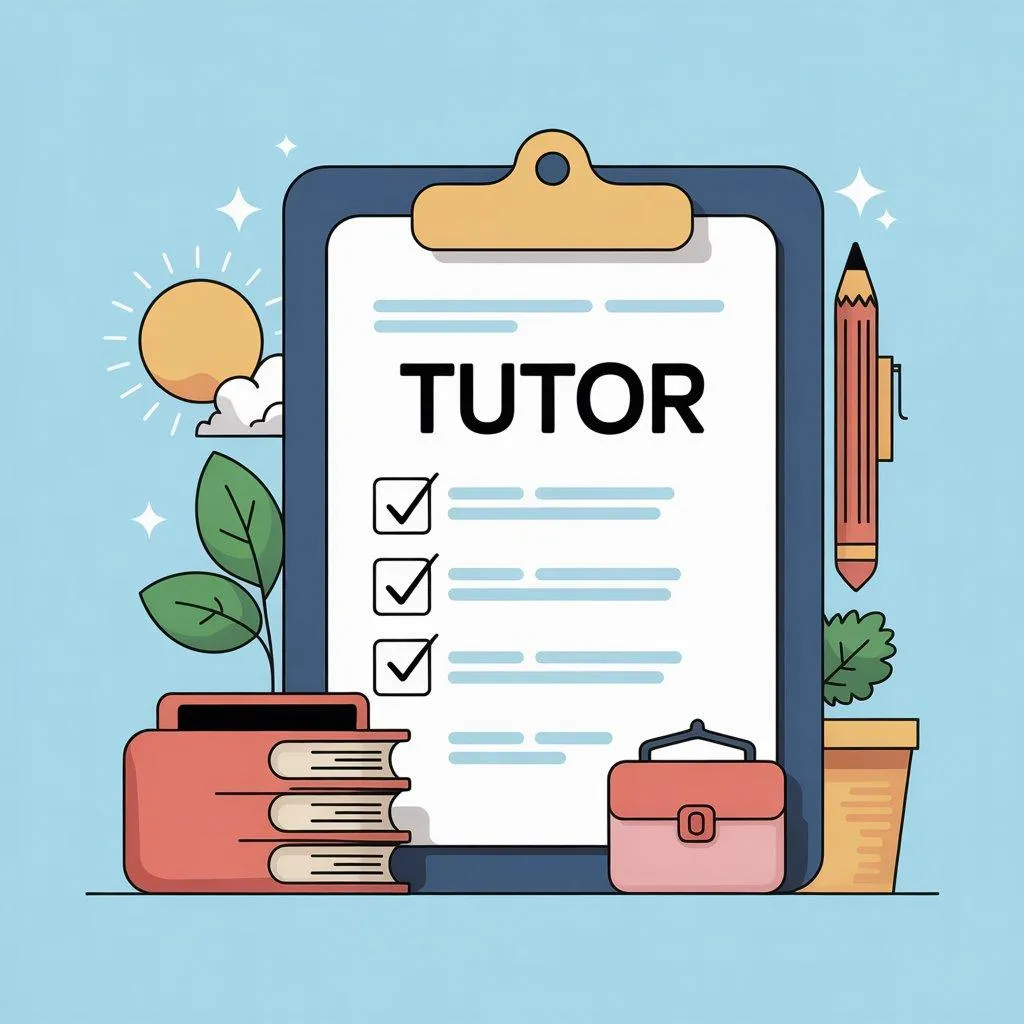
The formal v informal requirements required to be a tutor in the UK
5. Get Organised for Your First Lesson
How to prepare a simple lesson plan.
Over prepare. I recently created a free download focusing on preparing for a lesson. Inside it includes some templates to support you in preparing for a lesson.
In order to prepare for the first lesson, I would suggest prior to starting you spend a few minutes thinking about what the parents have told you about the child and their requirements. Prior to meeting the child, it is probable that this will be the only guidance that you have to work with.
Think about what it is that you have agreed to focus on initially, it might be something very specific such as subtracting negative numbers or solving quadratic simultaneous equations. It is it something much vaguer like “maths, please”.
Try to get it slightly more concise if you can.
Years ago, I went to a family, the mum had phoned and said that her lad was dyslexic and a very long way behind in maths.
I knew the family, I had worked with the dad, then not long after they bought my family home. Then probably 10 years later, my lad ended up being their son’s primary school, year 6 mentor.
Because there had been lose connections in the past, the mum said she’d rather get straight into the lessons rather than wasting time meeting up first. The boy was a long way behind, so she wanted us to go back to the very beginning and cover the very basics.
He was probably in year 7 or 8 at this time. So, I took a range of resources covering areas such as multiplying, division, adding, subtracting, negative numbers with me. The lad clearly wasn’t as far behind as needing to go back to the beginning.
When I got these out, he just sat and looked at me as if I was thick.
Surely, I could see he wasn’t 5 any more… It was a disaster.
The mum messaged afterwards and said they wouldn’t be continuing, it wasn’t what the lad had been expecting.
“Back to the beginning” “maths”, etc. It is all very ambiguous, so if you can get something more precise the lesson is more likely to be a success.
Once you have decided what you are going to focus on break it down into specific learning goals and the resources you will need to achieve them.
I normally allocate each task less time than I know it will take so that it is probable that I will end up with too much rather than too little.
If you are working with a younger child, you might throw yourselves straight into a game and then you can access their abilities as you play. With an older child might start with creating a “how to solve” sheet so that they have it for revision purposes afterwards.
When you are preparing each activity, think about what you will need to carry it out: pen, paper, pencil, coloured pens, rubber, dice, counters, calculator, model questions, etc. Check and double check that you have everything that you will need.
At the start of the first lesson, I will take a “starter pack” with me. It is nothing fancy just pen, paper, etc that they might need for the lessons. It acts as an icebreaker but also saves the parents from needing to find suitable resources and helps you to look professional and organised.
Setting expectations with parents and students.
Prior to the lesson, talk with the parents what they should expect. If it’s an online lesson, tell them when you will send them the link. It may be that you create a PDF that you create in advance which includes what will happen in the journey. It might also include how you invoice the lesson and your cancellation policy.
When I start the lesson, I always explain to the child that: “this is what I have with me, if it is too easy, too hard, or just not what you wanted, let me know and I will happily change it for next time. A large part of the first lesson is about getting to know you and what you want.”
At the end of the session, I will once again reinforce that if they want anything changing for next time, tell you and you will happily adapt. I recently started working with a year 7 lad on creative writing. I turned up with a selection of resources, predominately based around games. I asked what he would like to start with and responded that he didn’t mind. I grabbed a game thinking it would work well as an icebreaker and help to establish his abilities. He looked at me and asked: “how is playing games going to help my academic achievements?”
I spent the next couple of minutes explaining the benefits of using creative and multiple resources. He clearly wasn’t convinced, and I haven’t taken games with me again since. Instead, we talk, and he writes. He seems much more satisfied with this.
Resources to have on hand: stationery, games, visual aids.
Like mentioned previously, ensure that you have everything you need to hand to complete the activities. If you rely on the family having what is needed, a lot of time is often wasted waiting for them to try and find it. If you are working online/in a virtual environment it will be much harder to provide what is needed, so I would again inform them in advance of what is likely to be needed.
6. Set Up a Productive Tutoring Environment
Whether it’s online, at home, or in a student’s home, what works best?
Working in the student's home
When you are in the child’s home it is often hard to control the environment. You might find yourselves working at the kitchen table whilst someone prepares the dinner, and other siblings wander in asking when it can be ready.
Alternatively, you might find yourself working on a small desk in the office, with personal letters left to a side and /or limited space.
Or, you might find yourself laid out on their bedroom floor, which if you are spending the time playing games, works really well sometimes.
In their home you have to be willing to adapt and go with the flow much more.
Working in your home
However, when you are working in your home you can create an environment that you hope will reflect the quality of the lesson you are hoping to provide.
Try to ensure that you will not be distracted by other family members
Have spare stationery and additional resources to hand in case they are needed.
Create an environment with few distractions, but at the same time try not to make it seem sterile.
A couple of years back I went to a young girl. It was winter and pitch black when I arrived. It turned out that the mum was also a tutor who provided group lessons in the annex attached to the side of the house. That is where we would be working.
When we went into the room, there were 3 rows of 3 wooden desks (the type where you can lift up the top and store your stationery inside). There were small wooden chairs for the children to sit on and the room was painted white, with one or two grammatical terms written on sheets of paper taped to a wall.
At the front of the room was the teacher’s desk, behind which was a bookcase containing folders and stern looking textbooks. The floor was made with stone tiles. I felt like I had travelled back in time.
It was barren and unwelcoming.
At the end, as I left it was requested that I stay on the path. It was pitch black and I couldn’t see the path. As an adult it was intimidating. I wonder how the children attending her lessons felt about it.
A lady I knew years back used to work from home and her dog would often sleep in its basket near the table. Apparently, she would occasionally, discreetly beckon it over when the work they were doing was getting tough so that the child had it as a confidence aid. Obviously, if the child didn’t like dogs, it would not be invited into the room. Such a stark contrast to the previous scenario.
What sort of ambiance do you want to create.
Providing online lessons
You can also consider this when working online. What is your background, is it the genuine room you are in or are you sat against a blank image, or in space, or the San Francisco Golden Gate Bridge. What vibe are you trying to create.
Ensure that as you scroll through resources on your screen that you are not showing personal details such as bank statements, someone else’s progress sheets, etc. Be mindful as to what can be seen on your screen.
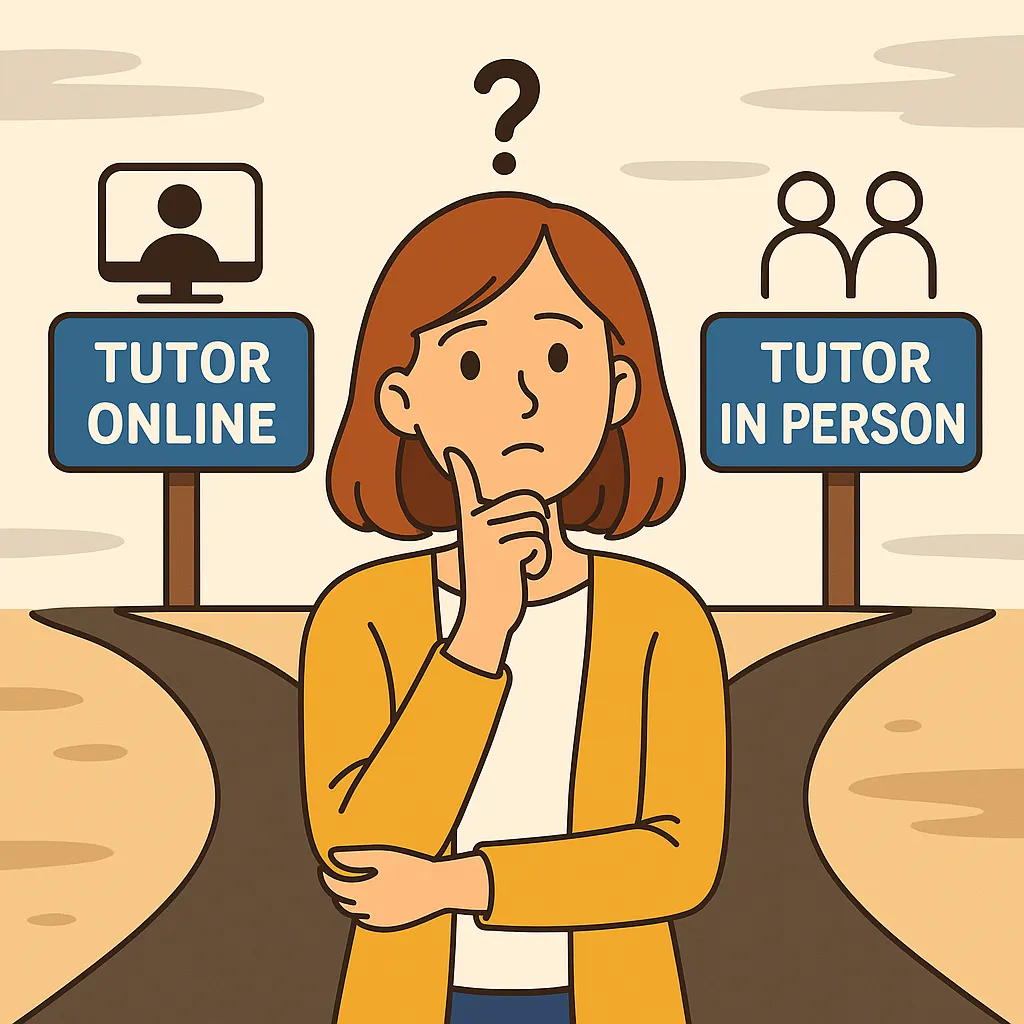
7. Communicate With Parents and Build Trust
How to involve parents before and after sessions.
Prior to the lesson you might decide it is beneficial to send the parents a copy of the lesson plan, although you can not guarantee that they will look at it, it does increase the chances that the resources that you take with you will also be relevant. If you don’t do this/ in addition to doing this, I would also suggest that you message them on the morning of the lesson and confirm that they are expecting you and ask if there is anything specific that they would like you to focus on.
Sometimes, you can make arrangements at the end of the previous lesson for the next lesson, but they move on during the week and so that is no longer relevant. When you arrive that is when you are informed that all your preparation is now null and void. If you can double check in advance, you will make life easier for yourself and deliver a more beneficial, relevant session.
In addition, by doing this you are helping to keep the parents in the loop.
Sharing progress and building rapport for long-term relationships.
At the end of the session spend time talking with them about what you have covered, the resources you used and how their child got on. If you can’t have the conversation at the time, ensure you message them to let them know.
If you rely on the child to pass on the information there is a high probability, they will never know what you did. If they are contemplating ending the sessions, they are less likely to recognise the value in them if they are unaware of what you are doing in them. In addition, by building that rapport they are more likely to recommend you forward to other people helping you to grow your business and your reputation.
8. Explore Different Tutoring Strategies
Varying your approach depending on the student’s needs and learning style.
No two people are the same. I look at my brother and myself and we are chalk and cheese.
I have 3 children (all adults now) again they are all very different with completely different learning styles and interests. If out of such a small sample everyone is different, imagine the range of characteristics and learning styles would become visible in a larger sample of people.
Some people are inspired by being challenged, others are just traumatised by being pushed. Some like to sit and discuss things in order to learn, others like to attempt worksheets. Others prefer something practical, whilst some prefer games. Everyone is different with a different starting point, journey and end goal. As a tutor you need to embrace this and consider what will work best for the child.
Incorporating games, visuals, and hands-on activities.
Recently at the staff summer dinner I was talking to one of the tutors about algebra and apparently, he uses the same analogy as my dad did to explain algebra.
At school we had been working on changing the subject in maths where instead of having r= 3s+2, you would have s=r-2 over 3'
The way the teacher explained it made no sense. No matter how many times she repeated herself there was still no logic in what she was saying.
That evening I sat down with dad, and he suggested I imagined a set of scales. Put everything to the left of the equals sign in one side and everything to the right in the other. So, if my question was r =3s+2 I would need to move everything over apart from the ‘s’ but at the same time I need to keep them balanced.
So, if I take a 2 from the right, I have made the left-hand side heavier, so I need to take 2 from there as well.
At the moment the ‘s’ is being multiplied by 3, so counteract that I would need to divide it by 3.
Again, to keep them balanced, I need to do the same to both sides.
This made sense, with something tangible to visualise it seemed logical.
I wonder if he knew how that conversation would change my life. I think that is hugely responsible for how I tutor.
This tutor, Neil, also spoke about how one lad he worked with he asked if they could play a game.
Ok.
I’m thinking of a number. I double it and my answer is 4. What is my number? 2. Well done.
I’m thinking of a number, I subtract 2 and my answer is 6. What is my number? 8. Well done.
They continue with similar examples for a couple of minutes, then he states, “Saying I’m thinking of a number is getting a bit repetitive, do you mind if I give it a name?”
Ok
“I’ll tell you what, let’s call it ‘x’”
“I have 3x’s and my answer is 9, what is x?” 3
“Fantastic, you can do algebra”
Start simple and build up but always present it to the child that is relevant and makes sense to them.
Look at the situation from their perspective, not just your own.
Deal with challenges and setbacks empathetically.
It is inevitable in life that things won’t always go as smoothly as you might have hoped. But try (and I appreciate it is sometimes hard) to look at the situation and ask what you can learn from it, how can it improve for another time.
I mentioned the lesson previously that I completely misread from the mum’s description of needing to go right back to the beginning. Another time you might think someone “has it” and you move on only to realise that they weren’t as confident as you thought and they are now back into the land of panic. Reassure them that, it’s not a problem, we can spend some more time working on it before moving on.
Always let them know that if they don’t get it, it’s not their fault, they’re not stupid it’s just you haven’t found a way that makes sense to them yet. To do so, is my job, my responsibility.
9. Prepare for Growth
How will you handle multiple students?
Be organised from the outset. Record everything: what you have studied with a child, what went well what didn’t. Days/times of lessons. Payment methods.
Everything. Because initially you may just have one or two students and you can store that information in your head, but as the numbers increase, it gets harder to do so. So, to remain organised and efficient make sure that you keep a record of everything. Be factual in your notes, so that if they are ever seen by another you can not be criticised for negative opinions.
In the free starter pack that I mentioned earlier I have also included the sheets that I use for recording my weekly lessons. It is also the same sheet that I request the other tutors use to hand in their hours and the invoices are created from.
Keep things simple and organised from the outset and create systems for yourself so that as you grow you can naturally expand with your systems.
Do you want to scale into a business or stay solo?
If you do decide to scale in time and employ other tutors, the more organised you are the easier it is to train the other tutors that come onboard. Be clear about your attitude to tutoring and the approach that you expect them to take. Sitting talking the other night at the summer dinner it was commented on what a diverse range of people the tutors are. This makes it so much easier when a parent gets in touch to ask a tutor who has a similar style to the one required by that specific child.
Don’t try to grow too quickly. Get strong, firm, foundations in place first and then take it from there.
Continuing to build your reputation and referrals.
I acknowledge that this is something I’m not so good at, but I know I ought to do. One of the best things you can do is to build your referrals and testimonials. Once a family has had a couple of lessons with you, when you send invoices, the end of term, results day, etc use each of these as an opportunity to ask if they are happy. If they say yes, (this is the bit I struggle with) ask them if they would be willing to leave you a testimonial on whichever platform you are trying to grow: Facebook, Google, etc. Give them the link and even give them a template to use if you want to. Make it as easy as possible for them to do.
The more testimonials you receive, the more credibility it gives to your business. It helps to earn genuine trust. There will always be those who suspect you have asked your family and friends to do create them, but most people will provide you with the credit you deserve.
Tutoring can make an incredible impact on lives, both your own and those you work with. A couple of years ago I received this from the mother of a young lad:
Hi Dawn
I wanted to say a huge ginormous thank you to you for everything you've done for F. You have helped him so much in his maths and english. But for him it's more than that. Before starting with you he was in a really bad place. He felt education wasn't for him and had no hope of passing anything or achieving anything. But by teaching him maths in a way he understood he started to believe that he wasn't totally stupid and maybe he could pass. And then that spiralled as he got better at maths he starting thinking he could maybe do other things and it's really changed his whole outlook. I never thought i'd be sitting here with him discussing A levels let alone him considering going to college after 6th form to studing computing. He is like a different person!
So a huge thank you from all of us and we will let you know how he gets on.
I hope you have a wonderful summer!
(He got a level 8 in maths).
That’s why we do what we do as tutors. We are lucky enough to be able to change the lives of hundreds of children and that really is a true privilege.
Ready to Take the First Step?
Becoming a tutor doesn’t mean having all the answers — it means being ready to help someone else find theirs.
If you're still reading, there’s a reason. You care. You want to do this the right way.
To support you, I’ve created a free Tutor Starter Pack with checklists, templates, and practical guidance, the same tools I used when I first began.
💡 [Add your download link or instructions here]
Start where you are. Use what you have. Take one step forward today.
Good luck

Copywrite: Clara James Tutoring 2025

